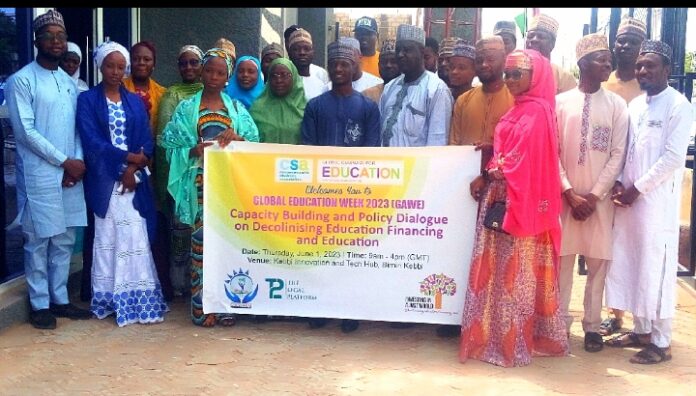The Global Campaign for Education (GCE), has trained stakeholders on decolonising education financing and education in Kebbi.
Malam Marwan Umar-Gwamba, a member of Youth Action Group, Global Campaign for Education, (GCE), stated this at a one-day Capacity Building on Decolonizing Education Financing and Education Curriculum in Kebbi State, marking the 2023 Global Education Week (GAWE) in Birnin Kebbi on Thursday.
He said,” Global Campaign for Education was established to unify the Civil Society Organization’s Movement.
“The gathering aims to have conversations with various representatives of students’ unions and policymakers in the state on Decolonizing Education Financing and Education Curriculum towards the upliftment of education sector in Kebbi State.”
Umar-Gwamba said this year’s theme; Advocating for Decolonization of Education Financing and Curriculum” was chosen to emphasize the need for the restructuring of the education fund particularly, those from the Donor Agencies.
“It seeks to improve the coordination of the state actors, mobilizing greater levels and more diversified sources of equitable and efficient financing to education — including on an inter-ministerial level.
“All states are responsible for ensuring the right to education for all but in doing so, they must provide adequate and sustainable public funding.
“This key obligation is enshrined in several binding human rights instruments and stressed by the 2030 Education Agenda, which includes the call for all governments to allocate the maximum of available resources to education.
“Holding governments to account for the upper end of the financing benchmarks outlined by the international law and political frameworks requires continued advocacy to ensure that education remains a budget priority,” he said.
Umar-Gwamba noted that the limited progress in education financing required greater efforts to overcome the colonial relations that continued to weigh on states related to public financing.
He reiterated the commitment of the GCE to building inclusive, egalitarian, culturally responsive free education.
In her remarks, the Permanent Secretary Ministry of Budget and Economic Planning in the state, Hajiya Aishatu Usman, said the state government was doing its best in the renovations and provision of teachers in the schools across the state.
“The government alone can not cater to all the needs of the education sector, hence the need for wealthy individuals’ contributions in the upliftment of the education sector in the state to achieve the aim of GCE in decolonizing education financing and education curriculum in the state,” she said.
Earlier, Alhaji Ahmad Rufa’i, the state Chairman of the National Youth Council of Nigeria (NYCN), observed that the colonial legacy continued to misrepresent the nature of financial problems in some states in the country.
“This has led to the belief that the scarcity of resources is attributable to the lack of people’s capacity to solve their national problems, for which international aid is frequently proposed as a panacea to domestic budgeting. Thus, hiding the business ambitions and political domination behind it,” he said.
Rufa’i commended the members of GCE and partners for joining the global action week for education in the state.
On his part, Alhaji Ibrahim Ngaski, the state Chairman of the Civil Society Organisation (CSO), urged the state government to see education as an investment, not a consumption.














